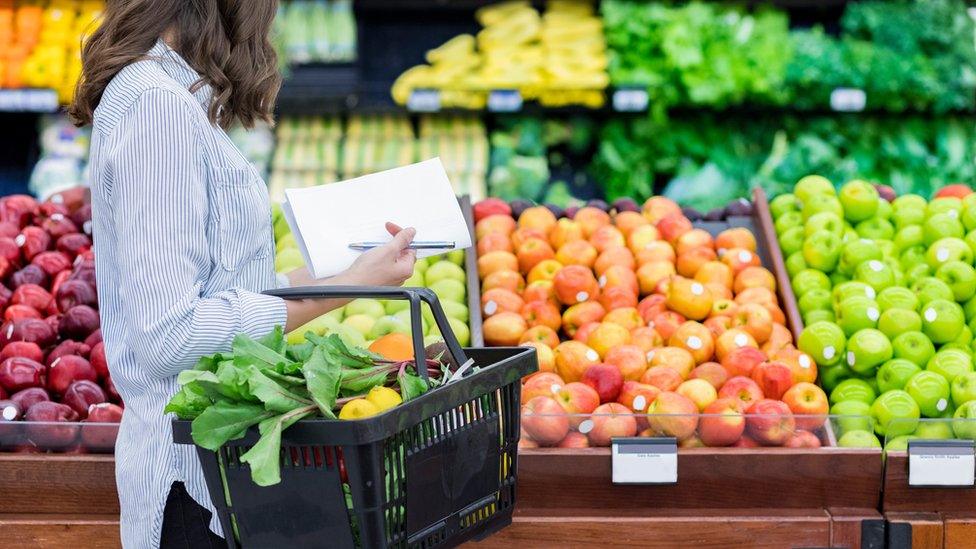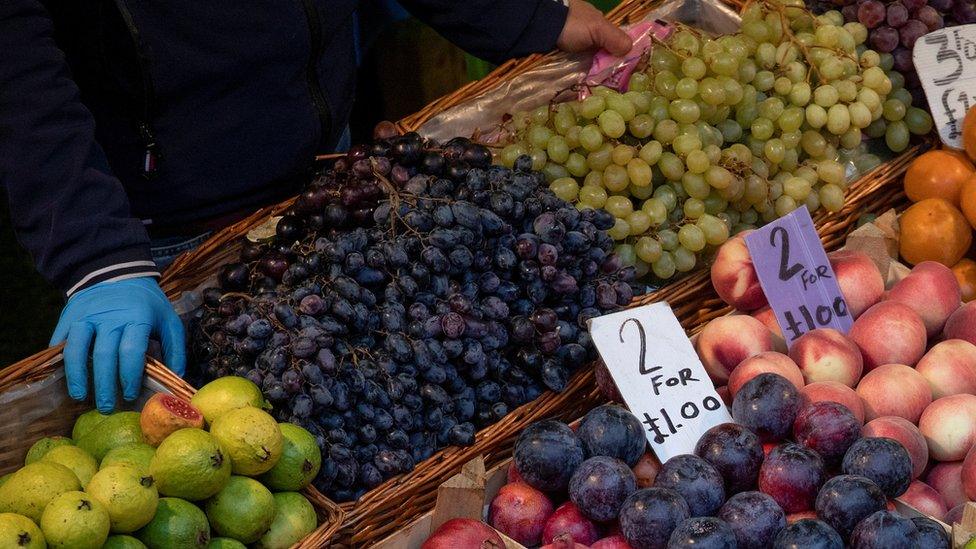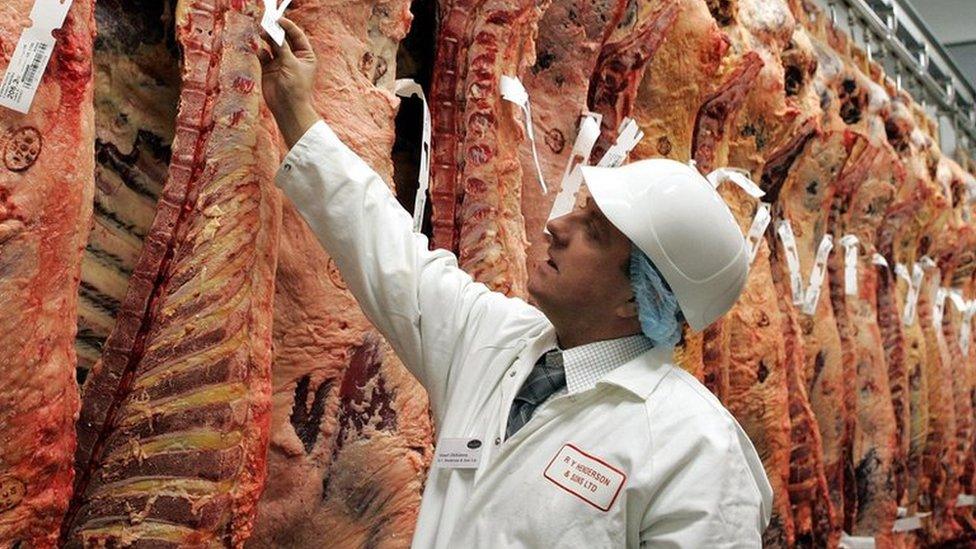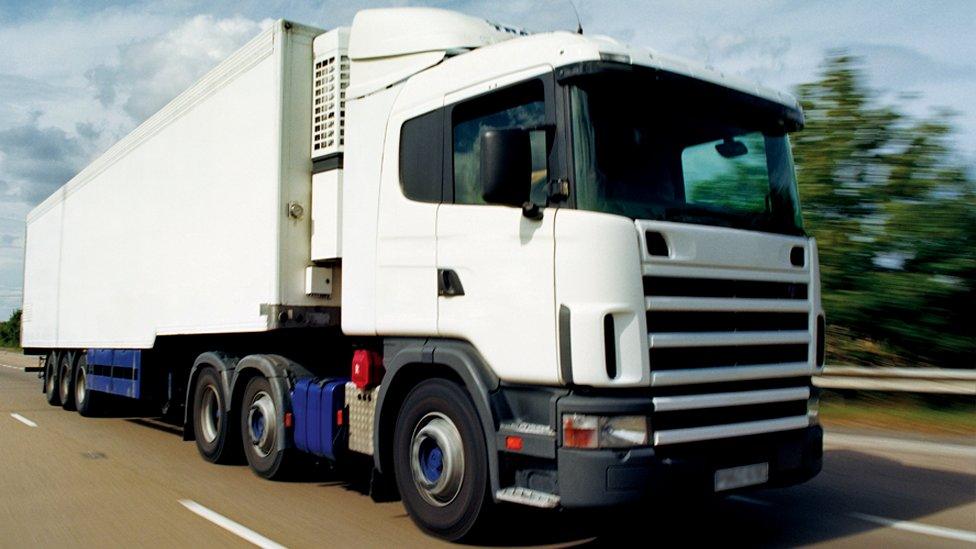Food price rise fears amid staff shortages
- Published
- comments

The national shortage of lorry drivers could lead to a rise in food prices, wholesalers have warned.
Darren Labbett, managing director of Woods Foodservice, told the BBC that his industry was facing a "perfect storm" of adverse effects.
"We've got the Brexit situation and the after-effects of the pandemic coming together at the same time," he added.
Mr Labbett said the cost of vegetable oil was at a 30-year high because of higher shipping costs and demand.
"As we came out of lockdown, the demand for everything went through the roof overnight," he said.
Mr Labbett added that wholesalers were "trying our utmost" to absorb the extra costs instead of passing them on, "but we can't absorb those price increases forever".
James Bielby, chief executive of the Federation of Wholesale Distributors, which represents about 600 firms in the wholesale sector, said there were "chronic" staff shortages throughout the food and drink supply chain, with up to half a million vacancies.
"That means all businesses - growers, processers, wholesalers and manufacturers - having to offer incentives to retain and recruit staff, and costs are rising as a result," he told the BBC.
"Under these circumstances, it is inevitable that some of these cost increases will be passed through the supply chain, which will lead to food price inflation."
Many businesses have been complaining about the UK's shortage of lorry drivers, which continues to cause serious supply chain problems.
The coronavirus pandemic, Brexit and tax changes have all contributed to a lack of qualified drivers. Industry bodies estimate there is a shortfall of about 100,000 workers.
On Thursday, Andrew Opie, director of food and sustainability from the British Retail Consortium told the UK Trade and Business Commission food manufacturing was under severe strain because of shortages of HGV drivers and other supply chain staff, meaning that some production might have to move out of the UK.
The British Frozen Food Federation's chief executive, Richard Harrow, told the commission he was concerned that smaller food businesses like wholesalers and catering firms were missing out because haulage companies were having to prioritise bigger customers like supermarkets.
"Many wholesalers have seen their businesses close down during the pandemic with the restaurant industry closed, and so they had a very difficult period," he said. "Now they're coming out of that and seeing strong demand, but they're struggling to get drivers and struggling to get deliveries.
"If you're a haulage company and you're restricted because of drivers, you're going to go where the work is easiest. If you're then being asked to drop a number of different pallets in different locations to smaller wholesalers, it ticks the 'too difficult to do' box', so I think they will be disproportionately impacted," Mr Harrow added.

Industry bodies estimate there is a shortfall of about 100,000 truck drivers
However, wholesalers point to a number of other factors that are also threatening to push up prices.
David Josephs, owner of All Greens Wholesale, a fruit and vegetable importer and wholesaler in London, said Brexit had been the biggest cause of additional costs for his business.
"We have an operation out of Milan, we ship twice a week, and just those two shipments a week coming out of Milan, the paperwork, purely the paperwork, is costing us an additional €52,000 (£44,650) a year," he told the BBC.
"But with Covid now as well, growers around Europe have been affected with labour shortages and therefore, goods haven't been picked out of the ground and therefore there is a shortage."
Bad weather had also reduced crop yields, he added.

Weekly wholesale food prices
Week to 27 August 2021, compared with week to 28 August 2020

Which have gone up in price?
Leeks, latest price £1.26 per kg: same week 2020, £1.23
Turnips, latest price £1.83 per kg: same week 2020, £1.53
Round tomatoes, latest price £1.47 per kg: same week 2020, £0.75
Brown bulb onion, latest price £0.53 per kg: same week 2020. £0.43
Beetroot, latest price £0.55 per kg: same week 2020, £0.48
Which have gone down in price?
Conference pears, latest price £1.02 per kg: same week 2020, £1.15
Carrots, latest price £0.49p per kg: same week 2020, £0.54
Source: Department for Environment, Food and Rural Affairs

Related topics
- Published2 September 2021

- Published2 September 2021

- Published15 October 2021
